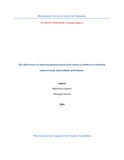
Please use this identifier to cite or link to this item:
https://hdl.handle.net/20.500.14301/443| Title: | The effectiveness of mind management-based interventions in adolescent well-being, empowerment, and academic performance |
| Authors: | Ghimire, Mani Ram Subedi, Dhanapati |
| Citation: | Ghimire,M.R.& Subedi,D.(2024). The effectiveness of mind management-based interventions in adolescent well-being, empowerment, and academic performance . |
| Issue Date: | Sep-2024 |
| Publisher: | Kathmandu University School of Education |
| School: | SOED |
| Department: | DOEL |
| Level: | M.Phil. |
| Program: | MPhil in Educational Leadership |
| Series/Report no.: | ;06 |
| Abstract: | This study aims to look into the effectiveness of Mind Management-Based Interventions (MMBIs) in improving adolescent well-being, empowerment, and academic achievement. Mindfulness practices, cognitive-behavioral approaches, neuro-linguistic programming (NLP), psycho-pedagogical frameworks, and stress management tools are examples of MMBIs that increase emotional regulation, resilience, and cognitive functioning. The study compiles data that MMBIs favor teenage well-being, empowerment, and academic success. It looks into how MMBIs can lower stress, anxiety, and depression while also improving self-esteem, self-efficacy, and a sense of control. The study also looks into probable mechanisms by which MMBIs affect academic performance, such as increased attention, concentration, and memory. Participant observation, unstructured interviews, and discussion techniques were used in the research's qualitative-narrative design to collect data. Both the participants and the research field were carefully chosen with convenience in mind. The diary was used to keep track of daily events. Utilizing the theories of mind management approach functionalism, post-structure, management, and educational process, the study's findings were examined. The findings have practical implications for applying MMBIs in educational contexts, revealing how schools and institutions might improve adolescent development and academic attainment. The study underlines the importance of a comprehensive strategy to promoting emotional well-being and empowerment in the early years of teenagers. Keywords: Mind management, Psychopedagogy, Neurolingustic programming, academic achievement, adolescent's empowerment, stress, mindfulness |
| URI: | https://hdl.handle.net/20.500.14301/443 |
| Appears in Collections: | Working Papers |
Files in This Item:
| File | Description | Size | Format | |
|---|---|---|---|---|
| Working Paper 6 Mani Ram Ghimire (1).pdf | 449.45 kB | Adobe PDF |  View/Open |
Items in DSpace are protected by copyright, with all rights reserved, unless otherwise indicated.